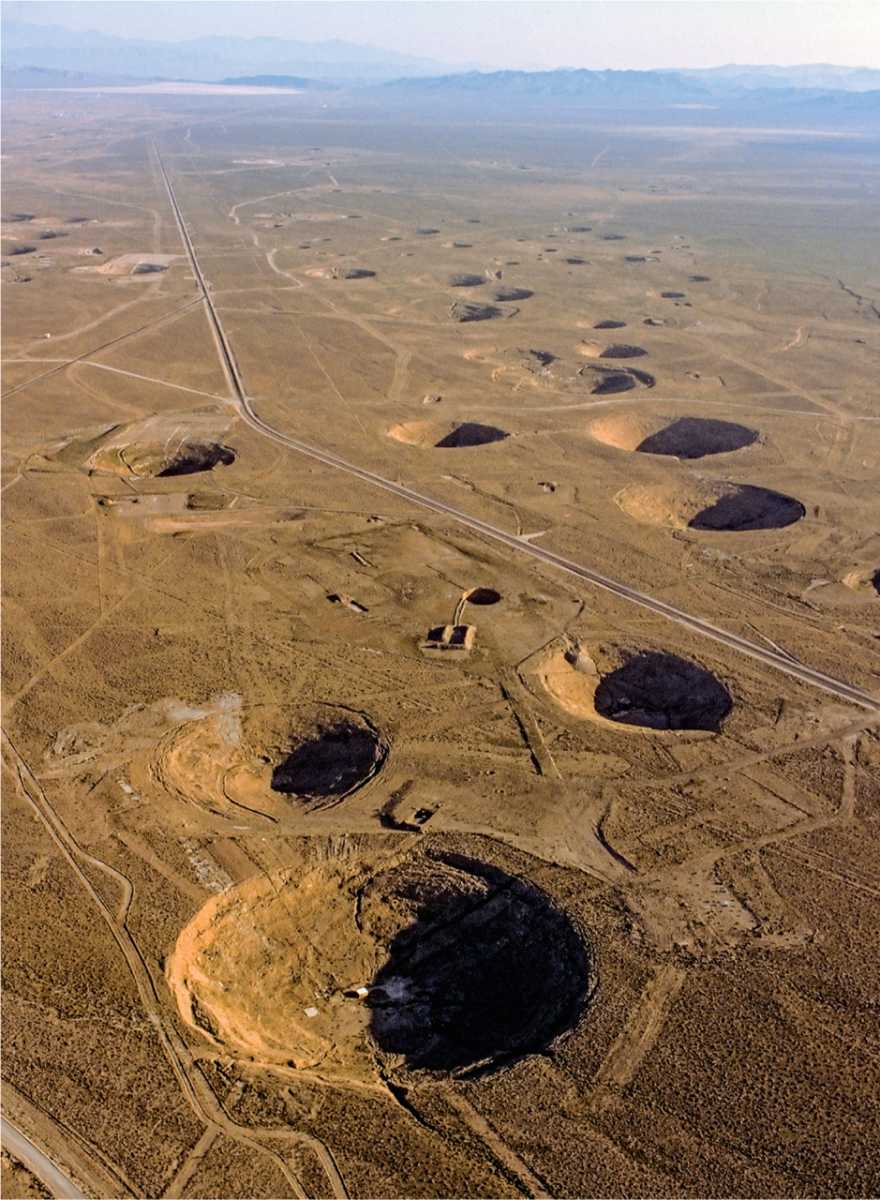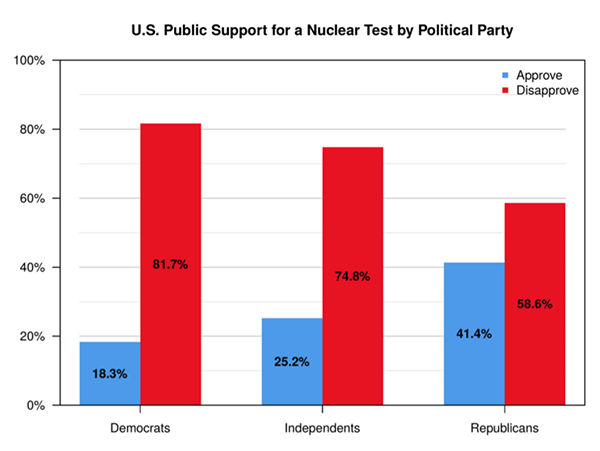Volume 12, Issue 5, July 1, 2020
Updated July 20, 2020
Senior White House officials have reportedly discussed a demonstration nuclear test explosion to try to coerce Russia and China to come to the arms control negotiating table.
On May 22, The Washington Post cited a senior administration official as saying that a nuclear test could strengthen the U.S. negotiating leverage on a possible trilateral arms control deal with Russia and China. The official said the proposal is “very much an ongoing conversation.”
 Even if President Donald Trump does not order such a test, the fact that it was even discussed at all merits prompt Congressional action to ensure it is no longer under consideration and to put in place checks and balances on any future proposal to do so.
Even if President Donald Trump does not order such a test, the fact that it was even discussed at all merits prompt Congressional action to ensure it is no longer under consideration and to put in place checks and balances on any future proposal to do so.
Making matters worse, Sen. Tom Cotton (R-Ark.) won approval in a party-line committee vote for his amendment to add $10 million to the National Defense Authorization Act for fiscal year 2021 for a nuclear test explosion.
As Vice President Joe Biden said May 28, resuming nuclear weapons "testing in Nevada is as reckless as it is dangerous. We have not tested a device since 1992; we don’t need to do so now.”
This week, July 20, the House will consider an amendment (#29) to the National Defense Authorization Act (NDAA) introduced by Reps. McAdams (D-UT), Gabbard (D-HI), Titus (D-NV), McGovern (D-MA), Horsford (D-NV), and Susie Lee (D-NV) that is designed to prohibit funding for a demonstration nuclear test explosion in fiscal year 2021.
Members of Congress need to consider the following facts as they weigh-in on this critical issue:
- Resuming nuclear testing would be nuclear nonproliferation malpractice. There is no chance a demonstration nuclear test explosion would compel Russia or China to make unilateral concessions at the negotiating table. Instead, it would harden their positions, undermine the global nuclear Nonproliferation Treaty, and transform the United States from a nonproliferation leader to a nonproliferation rogue state.
- A resumption of U.S. nuclear testing, for any reason, would increase incentives for other nuclear-armed states to conduct their own tests. The nuclear weapons programs of countries, including China, India, North Korea, Pakistan, and Russia would have far more to gain from nuclear explosive testing than the United States, which has conducted more nuclear tests (1,030) than all other states combined.
- The United States does not need nuclear test explosions to ensure the reliability of its nuclear arsenal. For more than a quarter-century, the Science-Based Stockpile Stewardship Program has worked extraordinarily well in ensuring the reliability of the existing nuclear warhead types in the U.S. arsenal. The overwhelming majority of the past U.S. nuclear test explosions were for “weapons development” and “weapons effects” purposes. There is simply no technical reason to resume testing now, nor in the foreseeable future.

- Public opinion polling continues to show that overwhelming majorities oppose the resumption of nuclear testing. A recent public opinion survey conducted between Aug. and Nov. 2019 shows that 71.9 percent of all Americans would oppose a nuclear test if conducted today. Since the 1990s, public opinion polling has consistently shown that Americans of all political stripes approve of the United States continuing to abide by its moratorium on nuclear testing by wide margins.
- Over the years, nuclear testing has killed or sickened thousands of military personnel who were involved in the detonations, as well the people who lived downrange from U.S. test sites, including tens of thousands in the continental United States. These impacted communities are still dealing with the devastating legacy of nuclear testing decades after the U.S. conducted its last nuclear test in 1992. The responsible step for Congress would be to extend and expand the Radiation Effects Compensation Act (RECA) rather than to endorse talk of resuming U.S. nuclear testing, which would dishonor the experiences of downwinders and atomic veterans.
- A resumption of U.S. testing would violate the global taboo against nuclear testing established by the 1996 Comprehensive Test Ban Treaty. As one of the 184 signatories of the CTBT, the United States has a legal obligation not to take actions that violate the object and purpose of the treaty, which is to prohibit nuclear test explosions, no matter what the yield. Renewed testing by the U.S. would undermine global support for operating and maintaining the treaty’s International Monitoring System, which the United States itself depends upon to help monitor other states’ compliance with the nuclear test ban.
- Safeguards should be put in place to ensure that no president may resume U.S. nuclear testing for any purpose, without a clear reason, adequate debate, or Congressional approval. Once ordered by the president, a “rapid” nuclear test explosion (without significant instrumentation) could be conducted in as little as six months, if not sooner, underground at the former Nevada Test Site, potentially with little or no Congressional input or public debate.
To ensure that the White House does not seek to side-step the role of Congress to review and authorize any request to conduct a nuclear test just months before the presidential election, Congress must enact legislation to require detailed reporting by the president on any proposal to resume testing and requires an affirmative vote by more than a simple majority of Congress.
In response to a question from David Sanger of The New York Times, Marshall Billingslea, the special presidential envoy for arms control, said June 24: “[W]e maintain and will maintain the ability to conduct nuclear tests if we see any reason to do so, whatever that reason may be. But that said, I am unaware of any particular reason to test at this stage. I won’t shut the door on it because why would we?”
There is no technical or geopolitical reason for the United States to resume testing.
If senior White House officials continue to insist that the president will not rule out the option of conducting a nuclear test explosion, it is vitally important that Congress step in to ensure that nuclear weapons testing is not an option the president may exercise unilaterally, now or in the future.—DARYL G. KIMBALL, executive director
